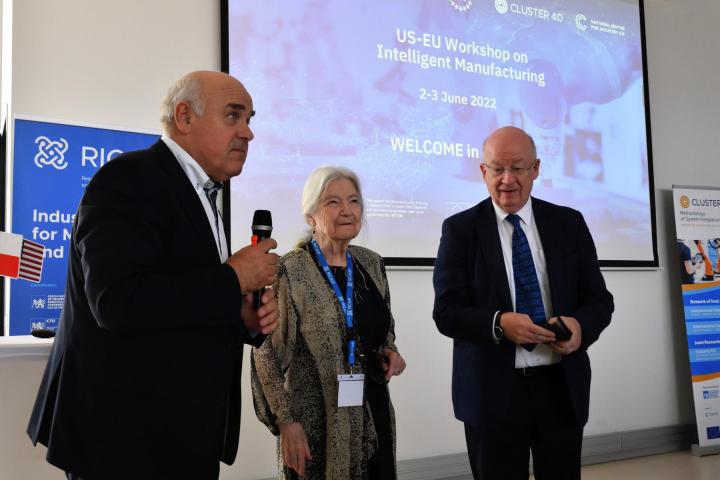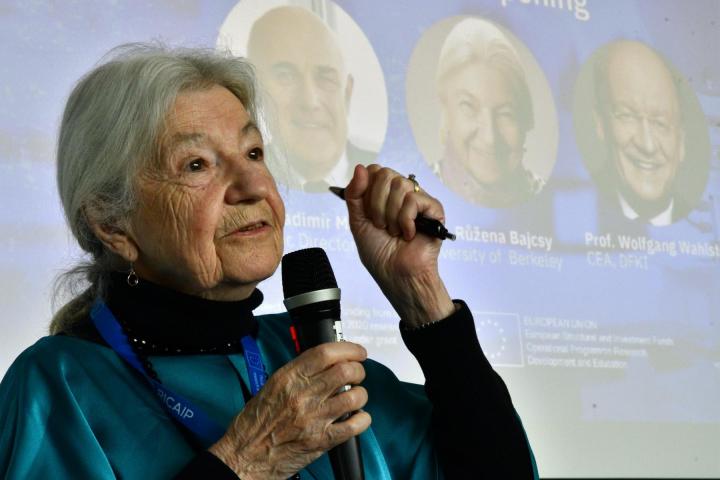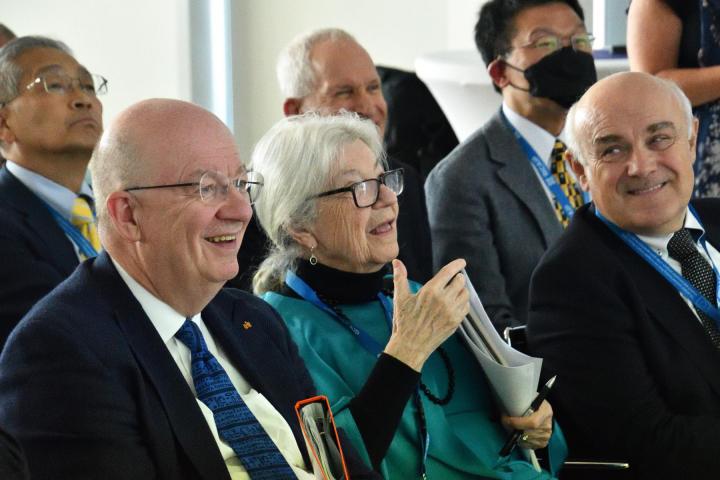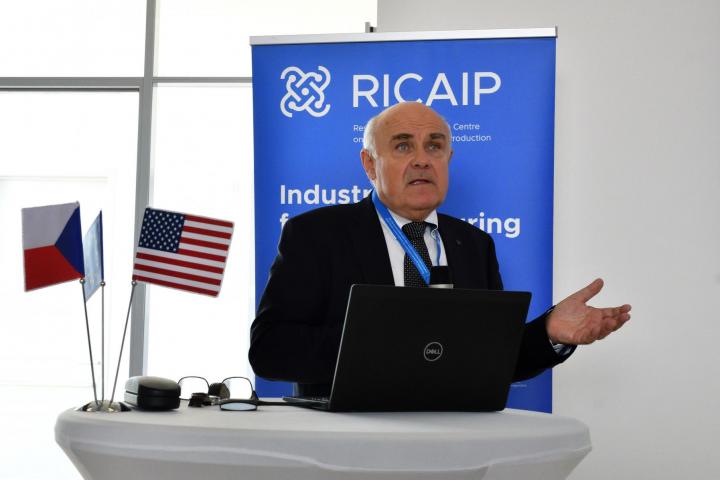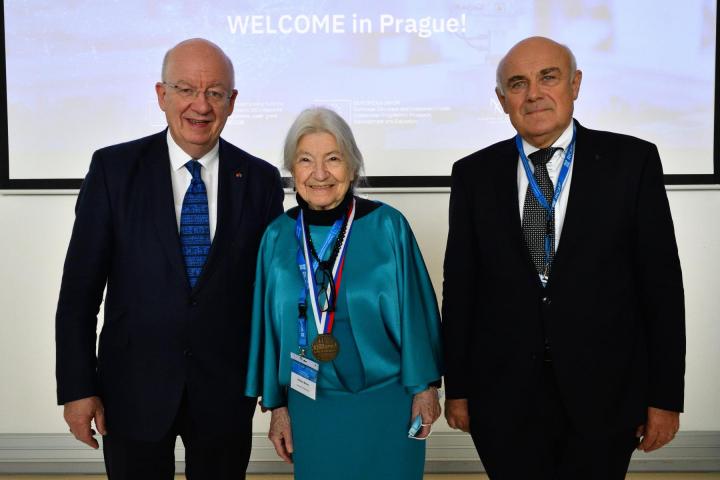The idea of organizing such an event in Prague has been in the works for the last few years, but due to the covid it could not be realized. The main driver of this meeting was Prof. Růžena Bajcsy, a legend in the field of robotics and artificial intelligence with a rich scientific career in the USA for more than 60 years. "I was born in Bratislava during the time of Czechoslovakia, so I feel a kinship with the technological development of this region," explains Prof. Bajcsy and continues, "It has been 30 years since both countries enjoyed democracy. My intention with this workshop was to bring the Czechs and Slovaks, and the EU, closer to what is happening in the US and vice versa, in the context of new technological developments affecting manufacturing."
Prof. Bajcsy pointed out that a closer intersection of robotics and manufacturing in the Industry 4.0 agenda would only strengthen the whole area. Her words were also confirmed by Prof. Wolfgang Wahlster, one of the three German "founding fathers" who defined the term Industry 4.0 (or Industrie 4.0) ten years ago, founder and chief executive advisor at DFKI - the German Research Centre for Artificial Intelligence. Prof. Wahlster adds: "The workshop was very timely because after one decade of Industrie 4.0 we had to identify the main challenges for the second decade of the fourth industrial revolution, which still has a long way to go. We have identified the need for end-to-end manufacturing testbeds, i.e. experimental laboratories that should also support distributed manufacturing, as we are developing, for example, in collaboration with our Czech partners within the RICAIP centre."
Another important topic for international cooperation is the standardization and certification of hardware and software components as well as architectures and communication protocols for Industry 4.0 to ensure semantic interoperability. Standardisation and certification can only be done at international level to prove that systems work properly. Cybersecurity is also very important, as manufacturing and industry are at the top of the list for hacker attacks and cybercrime.
"In addition, we need benchmarks and references to evaluate operating systems and software platforms for implementing smart factories in the Industry 4 paradigm. 0, because it has become clear that there are several competing approaches and the industry needs some guidance on which systems best meet its needs," says Professor Wahlster, emphasising, "To strengthen the resilience of solutions according to Industry 4.0 principles, we need to leverage the trends of industrial artificial intelligence, 5G in factory operations, as well as edge, fog, cloud and sky computing."
According to Siemens, there are now more than 50 billion connected devices in the world, so modern networks have to carry a huge load. While cloud or edge computing are already common in the industry and address latency issues, both sky and fog computing bring a new dimension to thinking about data. Sky computing is a new computing model on top of cloud platforms that aims to create large-scale distributed infrastructures and enable interoperability between clouds requiring large computing power. Fog represents a decentralized alternative to the cloud in which data, storage, and applications are stored somewhere between the data source and the cloud.
Speakers at the workshop mentioned several times that the greatest incremental progress has been made using machine learning as a real-time object recognition capability in traffic. Another trend that was identified is the combination of data-driven machine learning with engineering knowledge encoded in digital twins. Innovators are also expected to focus more on remote maintenance and repair. This is a really important issue for the industry, especially in any kind of emergency situation, as demonstrated during the covid crisis, in war situations or natural disasters, where political pressures are often put on supply chains as well.
Discussions indicated that new business models will be important for the further implementation of new approaches. Unlike simply purchasing a machine or a licence, innovative business models are based on the performance or use of the machines. "Some companies already do this, for example in Germany - you don't pay for the machine, but for the tasks the machine performs, such as drilling a certain number of holes," says Prof. Wahlster, describing an existing practice in innovative companies. The machine providers provide a complete service for the machine, so the price is based on the effect the machine achieves. This requires a completely new management mindset in the spirit of business informatics.
Finally, hybrid teams of workers and collaborative robots with different skill sets will enable a new form of team robotics for complex manufacturing tasks. Hand in hand with these developments, collaborative robots are taking on a new dimension, such as dual-arm robots or mobile robots that are not fixed to a single human worker position. Team robotics, with two or three robots working together with a team of humans, is a very important trend that will be especially popular in automotive manufacturing.
Prof. Vladimír Mařík, scientific director of CIIRC CTU, said that industry and smart manufacturing is a broad topic. This fact was reflected in the selection of speakers who came from California, Georgia, Illinois and North Carolina, but also from European countries such as Germany, Slovakia and Spain. "We are doing research in some areas and similar research is being done by teams in the US, Germany and the Basque Country, for example. We might be speaking in slightly different languages and use different approaches, but machine learning, artificial intelligence, digital twins, sensors, operating systems for Industry 4.0, data services and data spaces remain at the heart of the community," frames this diversity, Prof. Mařík continues, "We have just opened the door for much broader collaboration using the facilities that, for example, CIIRC CTU and DFKI can offer within the RICAIP centre, which is open to any international collaboration with European and American universities and organisations."
Prof. Wahlster added that the existing collaborative distributed testbeds in the Czech Republic - Prague, Brno and Ostrava - and Germany could now be extended to Spain and other European countries. "It would be great to extend this collaboration to the United States as well," Prof. Wahlster said. "Many American universities have similar facilities, but many do not. The network of experimental production facilities is quite impressive and many American academic laboratories would be envious," emphasises Prof. Bajcsy. From her point of view, this could be a motivation for cooperation between the US and the EU, which could make it easier for American students to come to Prague and carry out some collaborative yet exploratory experiments in the context of Industry 4.0 principles. "This approach could be mutually beneficial for both sides and I hope we will address it soon," plans Prof. Bajcsy.
The first transatlantic workshop on AI in manufacturing was organized with the support of the National Science Foundation (NSF), an independent federal agency established by the US Congress, and the ecosystem of RICAIP, CIIRC CTU and the National Center for Industry 4.0 with the support of the European CLAIRE initiative.
